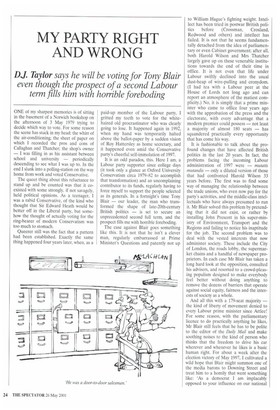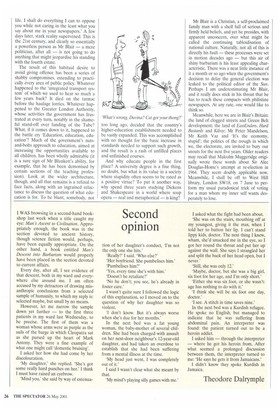MY PARTY RIGHT AND WRONG
DJ. Taylor says he will be voting for Tony Blair
even though the prospect of a second Labour term fills him with horrible foreboding
ONE of my sharpest memories is of sitting in the basement of a Norwich bookshop on the afternoon of 3 May 1979 trying to decide which way to vote. For some reason the scene has stuck in my head: the whirr of the air-conditioning; the sheet of paper on which I recorded the pros and cons of Callaghan and Thatcher; the shop's owner —I was filling in as his assistant between school and university — periodically descending to see what I was up to. In the end I slunk into a polling-station on the way home from work and voted Conservative.
The queer thing about this reluctance to stand up and be counted was that it coexisted with some strongly, if not savagely, held political opinions. As a teenager, I was a rabid Conservative, of the kind who thought that Sir Edward Heath would be better off in the Liberal party, but somehow the thought of actually voting for the ring-bearer of modern Conservatism was too much to stomach.
Queerer still was the fact that a pattern had been established. Exactly the same thing happened four years later, when, as a
paid-up member of the Labour party, I gritted my teeth to vote for the whitehaired old procrastinator who was clearly going to lose. It happened again in 1992, when my hand was temporarily halted above the ballot-paper by a sudden vision of Roy Hattersley as home secretary, and it happened even amid the Conservative party's cheerful self-immolation of 1997.
It is an odd paradox, this. Here I am, a Labour party supporter since college days (it took only a glance at Oxford University Conservatism circa 1979-82 to accomplish that transformation) and an uncomplaining contributor to its funds, regularly having to force myself to support the people selected as its generals. In a fortnight's time Tony Blair — our leader, the man who transformed the shape of late-20th-century British politics — is set to secure an unprecedented second full term, and the prospect fills me with horrible foreboding.
The case against Blair goes something like this. It is not that he isn't a clever man, regularly embarrassed at Prime Minister's Questions and patently not up to William Hague's fighting weight. Intellect has been tried in postwar British politics before (Crossman, Crosland, Redwood and others) and intellect has failed. It is not that he seems fundamentally detached from the idea of parliamentary or even Cabinet government; after all, both Harold Wilson and Mrs Thatcher largely gave up on these venerable institutions towards the end of their time in office. It is not even that life under Labour swiftly declined into the usual dust-heap of wire-pulling and cronydom. (I had tea with a Labour peer at the House of Lords not long ago and can report an atmosphere of the matiest complicity.) No, it is simply that a prime minister who came to office four years ago with the approbation of the press and the electorate, with every advantage that a modern premier could possess — not least a majority of almost 180 seats — has squandered practically every opportunity that has come his way.
It is fashionable to talk about the profound changes that have affected British politics in the last 20 years. In fact, the problems facing the incoming Labour administration of 1997 were — mutatis mutandis — only a diluted version of those that had confronted Harold Wilson 33 years before. The first was to find some way of managing the relationship between the trade unions, who even now pay for the party's activities, and the middle-class intellectuals who have always presumed to run it. Mr Blair solved this problem by pretending that it did not exist, or rather by installing John Prescott in his super-ministry of Environment, Transport and the Regions and failing to notice his inaptitude for the job. The second problem was to deal with the vested interests that now administer society. These include the City of London, the roads lobby, the supermarket chains and a handful of newspaper proprietors. In each case Mr Blair has taken a long hard look at the opposition, consulted his advisers, and resorted to a crowd-pleasing populism designed to make everybody feel better without doing anything to remove the dozens of barriers that operate against social equity, fairness and the interests of society as a whole.
And all this with a 179-seat majority — the kind of liberty of movement denied to every Labour prime minister since Attlee! For some reason, with the parliamentary licence to do practically anything he likes, Mr Blair still feels that he has to be polite to the editor of the Daily Mail and make soothing noises to the kind of person who thinks that the freedom to drive his car wherever and whenever he likes is a basic human right. For about a week after the election victory of May 1997, I cultivated a wild hope that Blair might summon one of the media barons to Downing Street and treat him to a homily that went something like: 'As a democrat I am implacably opposed to your influence on our national
life. I shall do everything I can to oppose you while not caring in the least what you say about me in your newspapers.' A few days later, stark reality supervened. This is the 21st century, and clearly so essentially a powerless person as Mr Blair — a mere politician, after all — is not going to do anything that might jeopardise his standing with the fourth estate.
The result of this habitual desire to avoid giving offence has been a series of shabby compromises, extending to practically every area of public policy. Whatever happened to the `integrated transport system' of which we used to hear so much a few years back? It died on the tarmac before the haulage lorries. Whatever happened to the Greater London Authority, whose activities the government has frustrated at every turn, notably in the shameful stand-off over funding of the Tube? What, if it comes down to it, happened to the battle cry 'Education, education, education'? Much of the government's nutsand-bolts approach to education, aimed at increasing the opportunities available to all children, has been wholly admirable (it is a sure sign of Mr Blunkett's ability, for example, that he has been demonised by certain sections of the teaching profession). Look at the wider architecture, though, and all that remains is a refusal to face facts, along with an ingrained reluctance to discuss the question of what education is for. To be blunt, somebody, not too long ago, decided that the country's higher-education establishment needed to be vastly expanded. This was accomplished with no thought for the basic increase in standards needed to support such growth, and the result is a rash of unfilled places and unfinished courses.
And why educate people in the first place? A university degree is a fine thing, no doubt, but what is its value in a society where stupidity often seems to be rated as a positive virtue? To put it another way, why spend three years studying Dickens and Shakespeare in a world where soap opera — real and metaphorical — is king? Mr Blair is a Christian, a self-proclaimed family man with a shelf full of serious and firmly held beliefs, and yet he presides, with apparent unconcern, over what might be called the continuing tabloidisation of national culture. Naturally, not all of this is directly his fault — these processes were set in motion decades ago — but this air of shiny barbarism is his least appealing characteristic. There was a neat little instance of it a month or so ago when the government's decision to delay the general election was leaked to the political editor of the Sun. Perhaps I am underestimating Mr Blair, and it really does stick in his throat that he has to reach these compacts with philistine newspapers. At any rate, one would like to think so.
Meanwhile, here we are in Blair's Britain: the land of clogged streets and Green Belt development; the land of EastEnders, Hard Bastards and Kilroy; Mr Peter Mandelson, Mr Keith Vaz and It's the economy, stupid': the politics of the trough in which we, the electorate, are invited to bury our snouts for the next five years. Older readers may recall that Malcolm Muggeridge originally wrote these words about Sir Alec Douglas-Home's attempt at re-election in 1964. They seem doubly applicable now. Meanwhile, I shall be off to West Hill library, London SW18, on 7 June to perform my usual paradoxical trick of voting for a man whom my inner self wants desperately to lose.



















































































 Previous page
Previous page